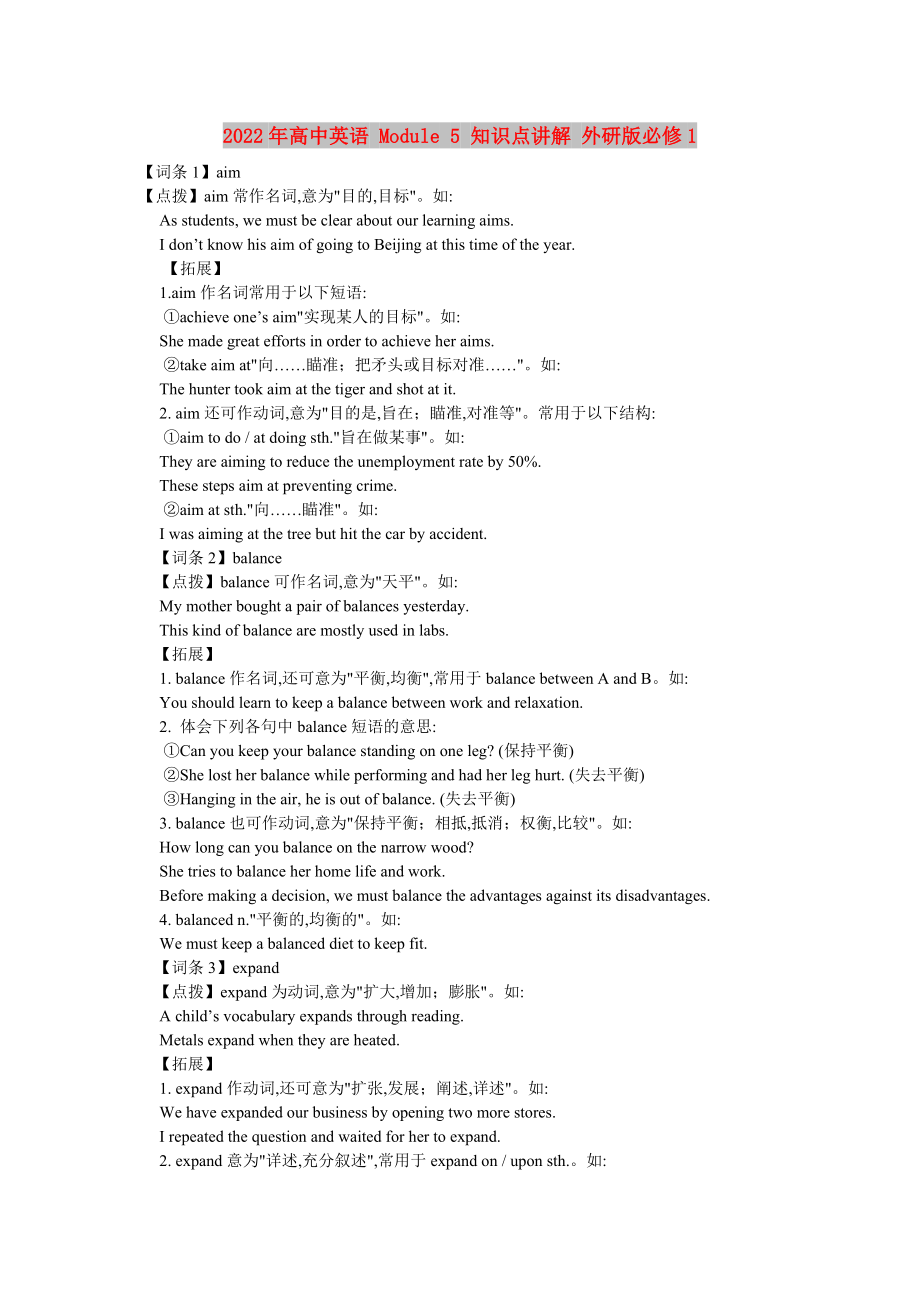《2022年高中英語(yǔ) Module 5 知識(shí)點(diǎn)講解 外研版必修1》由會(huì)員分享�����,可在線閱讀�����,更多相關(guān)《2022年高中英語(yǔ) Module 5 知識(shí)點(diǎn)講解 外研版必修1(3頁(yè)珍藏版)》請(qǐng)?jiān)谘b配圖網(wǎng)上搜索��。
1����、2022年高中英語(yǔ) Module 5 知識(shí)點(diǎn)講解 外研版必修1
【詞條1】aim
【點(diǎn)撥】aim常作名詞,意為"目的,目標(biāo)"���。如:
???? As students, we must be clear about our learning aims.
???? I don’t know his aim of going to Beijing at this time of the year.
???? 【拓展】
???? 1.aim作名詞常用于以下短語(yǔ):
???? ①achieve one’s aim"實(shí)現(xiàn)某人的目標(biāo)"����。如:
???? She made great effort
2��、s in order to achieve her aims.
???? ②take aim at"向……瞄準(zhǔn)�����;把矛頭或目標(biāo)對(duì)準(zhǔn)……"。如:
???? The hunter took aim at the tiger and shot at it.
???? 2. aim還可作動(dòng)詞,意為"目的是,旨在�;瞄準(zhǔn),對(duì)準(zhǔn)等"。常用于以下結(jié)構(gòu):
???? ①aim to do / at doing sth."旨在做某事"���。如:
???? They are aiming to reduce the unemployment rate by 50%.
???? These steps aim a
3�����、t preventing crime.
???? ②aim at sth."向……瞄準(zhǔn)"����。如:
???? I was aiming at the tree but hit the car by accident.
????【詞條2】balance
????【點(diǎn)撥】balance可作名詞,意為"天平"��。如:
???? My mother bought a pair of balances yesterday.
???? This kind of balance are mostly used in labs.
????【拓展】
???? 1. balance作名詞,還可意為"平衡
4�����、,均衡",常用于balance between A and B�����。如:
???? You should learn to keep a balance between work and relaxation.
???? 2. 體會(huì)下列各句中balance短語(yǔ)的意思:
???? ①Can you keep your balance standing on one leg? (保持平衡)
???? ②She lost her balance while performing and had her leg hurt. (失去平衡)
???? ③Hanging in the air, he
5���、is out of balance. (失去平衡)
???? 3. balance也可作動(dòng)詞,意為"保持平衡�;相抵,抵消��;權(quán)衡,比較"�。如:
???? How long can you balance on the narrow wood?
???? She tries to balance her home life and work.
???? Before making a decision, we must balance the advantages against its disadvantages.
???? 4. balanced n."平衡的,均衡的"。如:
?
6�����、??? We must keep a balanced diet to keep fit.
????【詞條3】expand
????【點(diǎn)撥】expand為動(dòng)詞,意為"擴(kuò)大,增加����;膨脹"。如:
???? A child’s vocabulary expands through reading.
???? Metals expand when they are heated.
????【拓展】
???? 1. expand作動(dòng)詞,還可意為"擴(kuò)張,發(fā)展����;闡述,詳述"。如:
???? We have expanded our business by opening two more s
7����、tores.
???? I repeated the question and waited for her to expand.
???? 2. expand意為"詳述,充分?jǐn)⑹?,常用于expand on / upon sth.。如:
???? Could you expand on that point, please?
???? 3. expandable adj."可擴(kuò)張的,可擴(kuò)充的"����;expansion n."擴(kuò)張,擴(kuò)展��;膨脹"����。如:
???? This is an expandable suitcase.這是個(gè)可伸縮的公文包�。
???? Though the econ
8、omic situation is not so good, the pany is confident of its further expansion.
????
????經(jīng)典短語(yǔ)透視
????【短語(yǔ)1】add...to...
????【點(diǎn)撥】add ... to ...意為"往……加入……"
???? 如:
Please add his name to this list.
???? Do you have anything to add to his statement?
???? 【拓展】常見(jiàn)的其他add短語(yǔ)還有:
???? ①add up"把……加起來(lái)�;合計(jì)起
9、來(lái)"����。如:
???? Add up the numbers in this line and then you will get the final result.
???? ②add up to"總計(jì)為……"。如:
???? All the students in our school add up to 572.
????【短語(yǔ)2】used to
????【點(diǎn)撥】used to 意為"過(guò)去經(jīng)?!?,其中to為不定式符號(hào),后接動(dòng)詞原形。如:
???? He used to climb the mountain every Sunday.
???? I used to sta
10�、y up late.
???? 【拓展】
???? 1. be used to do, be used to doing, used to do, be used as用法辨析:
???? ①be used to do 意為"被用來(lái)做某事"。如:
???? My literature book is used to be a pillow (枕頭)for the little boy.
???? ②be used to doing意為"習(xí)慣做某事",其中to 是介詞�����。如:
???? He has been used to living in the new school.
???
11�、? ③used to do意為"過(guò)去常常做某事"��。如:
???? I used to sing loudly in the music class.
???? ④be used as 意為"當(dāng)做……來(lái)用"����。如:
???? Papers were used as a table when we were having picnic last week.
???? 2. used to do 和would 用法比較:
???? ①兩者都表示過(guò)去的動(dòng)作,當(dāng)表示過(guò)去習(xí)慣性的動(dòng)作時(shí),兩者可互換�。如:
???? When we were children we would go skating
12�、 every winter.
???? 相當(dāng)于When we were children we used to go skating every winter.
???? ②若表示過(guò)去持續(xù)的狀態(tài),或強(qiáng)調(diào)過(guò)去與現(xiàn)在的對(duì)比,通常只用used to,
???? 不用would。如:He is not what he used to be.
???? I don’t smoke these days, but I used to.
????【短語(yǔ)3】be supposed to
????【點(diǎn)撥】be supposed to意為"應(yīng)該……���;本該……",其中to是動(dòng)詞不定式符號(hào),不是介詞,
13�����、其后要跟動(dòng)詞原形�。如:
???? My sister is supposed to be back from America two days later.
???? What you are supposed to do is studying well and being a useful person for society.
???? 【拓展】
???? 1. be supposed to do還可以意為"被期望……",它可以用來(lái)表示勸告�、議;義務(wù)�����、責(zé)任等���。如:
???? Everyone is supposed to reach the classroom a little
14�、 earlier than the bell rings.
???? 2. be supposed to have done意為"本應(yīng)做某事(但事實(shí)上沒(méi)有做)",表示一種虛假的情況�。如:
???? You are supposed to have handed in your homework by now.
???? 3. be supposed to的否定結(jié)構(gòu)為be not supposed to,它常用于口語(yǔ)中,意為"不被許可;不應(yīng)當(dāng)"���。如:
???? She was not supposed to be angry about that. 她本不該為那件事而生氣����。
???
15、?
????熱點(diǎn)語(yǔ)法聚焦
????形容詞��、副詞的比較級(jí)和最高級(jí)
????形容詞和副詞比較難把握的就是級(jí)����。本期我們主要學(xué)習(xí)一下形容詞、副詞比較級(jí)和最高級(jí)的構(gòu)成及一些表示比較的固定結(jié)構(gòu)���。
????一��、形容詞����、副詞比較級(jí)和最高級(jí)的構(gòu)成
???? 單音節(jié)和部分雙音節(jié)形容詞及副詞在詞尾加-er和-est構(gòu)成比較級(jí)和最高級(jí)���;多音節(jié)形容詞和副詞在原級(jí)前加more和most構(gòu)成比較級(jí)和最高級(jí)����。例如:
????
????原級(jí) 比較級(jí) 最高級(jí)
????bright brighter brightest
????thin thinner thinnest
????
16�����、important more important most important
????naturally more naturally most naturally
????hard harder hardest
????
????二�����、表示比較的結(jié)構(gòu)
????1. 比較級(jí)+ and + 比較級(jí),意為"越來(lái)越……"�����。如:
It’s being warmer and warmer.
2. the +比較級(jí),the +比較級(jí),意為"越……越……"�。如:
The harder you work, the better result you will get.
3. no more ... than ...,意為"……和……一樣不……"。如:
I have no more money than Lily.
4. no less than,意為"多達(dá),……那樣多"�����。如:
I think he has worked for no less than 5 years till now.
????
 2022年高中英語(yǔ) Module 5 知識(shí)點(diǎn)講解 外研版必修1
2022年高中英語(yǔ) Module 5 知識(shí)點(diǎn)講解 外研版必修1

